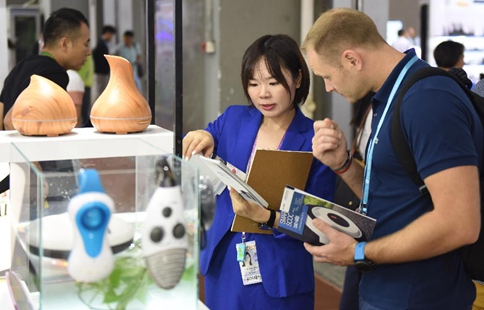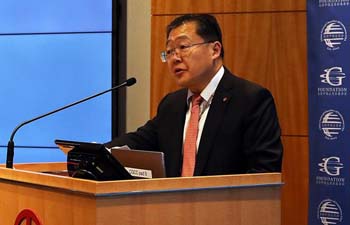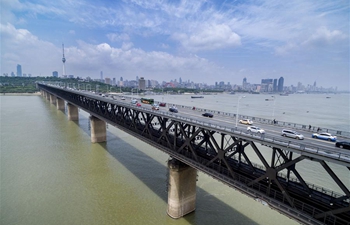by Denis Elamu
JUBA, Oct. 19 (Xinhua) -- As public transport fares keep rising due to rampant fuel shortage in the South Sudanese capital of Juba and other smaller towns, many working-class South Sudanese are getting increasingly discouraged.
The situation is likely to worsen without solution on the horizon to the unending hyper inflation caused by more than three years of violence.
Taban Aggrey, 48, a radio presenter who resides in the Gudele suburb located 2 km on the outskirts of Juba said that due to scarcity of public transport amid rising fares, he now spends 33 U.S. dollars monthly on transport to work which increasingly eats into his meager monthly salary of 43 dollars.
"Despite having money to pay as bus fare, sometimes it is hard to get a bus to board because people scramble for seats and I spend one and half hours to reach the office," he told Xinhua in a recent interview after having had torrid time getting to work in the central business area of Juba.
Aggrey is not alone in this catch 22 situation, but many working South Sudanese are finding life hard amid the persistent fuel shortage which has forced most owners of public vehicles to either hike fares or park their vehicles due to the hustle and bustle that they endure through long queues to acquire fuel.
A liter of fuel in 2013 before outbreak of conflict was costing less than one U.S. dollar but now it's selling for 10 dollars on the black market where most motorists prefer to buy fuel, avoiding restrictions and congestion characterized at most petrol stations of the state-owned Nile petroleum corporation.
"Sometimes if I want to reach office on time, for instance on rainy day, I will be forced to board a commercial motor cycle (boda boda) at cost of 3 dollars and this is very expensive for me, but I am left with no option," he disclosed.
He also added that transport costs has further left him with less money to cater for other basic needs of his family in anticipation of treatment cost due to untimely sickness, rent and school fees.
South Sudan's pound (SSP) is exchanging as high as 185 with the U.S. dollar following devaluation of the SSP in 2015 and ongoing hyper inflation.
"I am actually working for free; I do not even save anything, I just work to pass time and keeping busy because family expenses are far beyond my income," he revealed, adding that he sometimes survives on additional support from his brother.
Jacob Abuoi, 34, who works with an insurance company and lives in Sherikaat area about 5 km from Juba said he monthly spends 75 percent of his 33 dollar salary on transport toward work.
"Today I stood at the bus terminal for more than one hour until I was assisted by a good samaritan who gave me a lift using his private car while coming to work," Abuoi told Xinhua, while he stood anxiously among hundreds of people waiting to return home from work at a bus station.
"This lack of transport means it is becoming a serious problem for most of us who reside in this area, in some cases you may have money for paying the fare but still you don't find transport," he added in frustration, after missing a seat on one of the buses after several people scrambled for seats.
Abuoi quickly noted that a number of buses operating along this route have significantly reduced compared to previous times, when the fuel shortage was not dire like it is now, fueled by the prevailing economic hardship amid unending fighting in the North-Eastern parts of the war-torn country, home to some of the oil fields which have been affected by sustained violence by the warring factions.
Meanwhile, Joyce Juan, 47, an office cleaner in one of local government offices, said she has been forced to attend to work on daily basis due to huge costs of public transport.
"I have stopped coming to work on daily basis, I come only on Monday every week because I can no longer afford transport fare," she said, adding that her salary has delayed for over four months, hence discouraging her from work.
"At first when my boss realized that I was not coming to work regularly, he complained bitterly but I told him that I have no option. After sometime he (boss) started experiencing the same situation I was in and now he has stopped complaining," added Juan who earns a meager salary of 5 dollars.
Juan added that she has instead opened a small business of selling vegetables at the main Juba market of KonyoKonyo, trying her best to feed her family as the economic situation exacerbates.

















